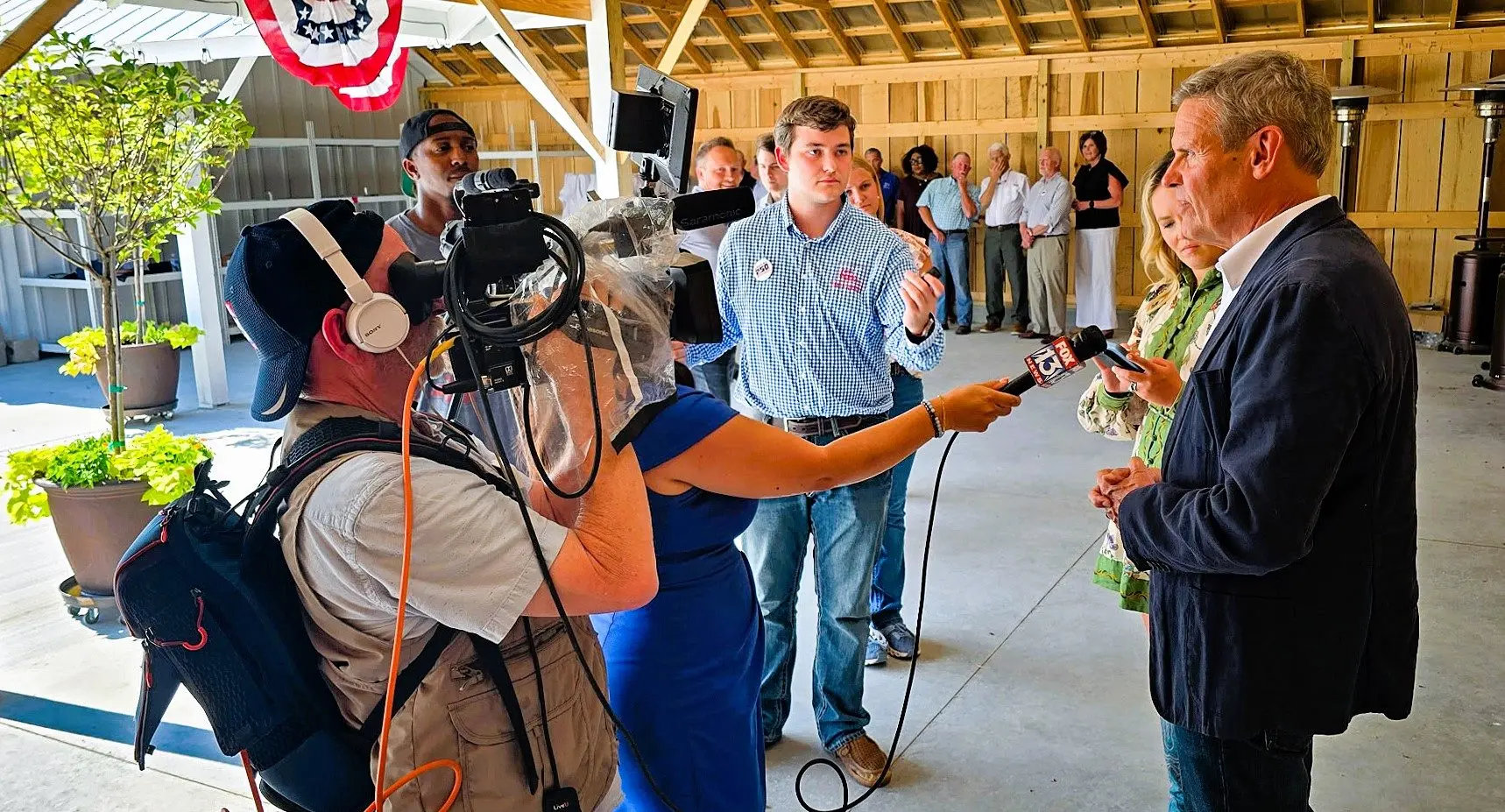
MARTIN, Tenn. – Preston Pooler believes the more experience, the better. Pooler of Paris, Tennessee, a junior agricultural business major with a minor in communications at the University of Tennessee at Martin, participated in a summer-long communications internship with the Tennessee Farm Bureau Federation earlier this year.
Pooler, who also works as a student photographer and videographer for the Office of University Relations, combined his interests in both agriculture and communications during his time with the TFBF. The internship allowed him to both hone his writing and photography skills, while also getting involved with farms across the state.
One specific aspect of the internship Pooler recounted is his work on the Young Farmers and Ranchers program, where farmers from the different Tennessee counties can apply for the Young Farmer of the Year award. Each applicant was featured in a short video about them and their farm, and the creations of these videos was a part of Pooler’s duties. Pooler described how this allowed him to see how other farms were being operated, and the unique aspects of each farm.
“You go far East Tennessee, in the mountains, and you see a completely different type of farming than you do here, you know, in Martin, Tennessee,” Pooler says.
Pooler’s writing and photography were featured in various publications, including the TFBF’s newspaper and magazine. He also described his experiences interviewing various policy and lawmakers, giving him the opportunity to discuss different policies and laws being passed concerning agriculture. Pooler recounted his experience interviewing Tennessee Gov. Bill Lee, as well as the U.S. Deputy Secretary of Agriculture, Stephen Vaden.
Pooler said that his experience on his family sod farm in Henry County, along with his involvement with FFA in high school and the Collegiate Farm Bureau at UT Martin, were what inspired him to apply for the TFBF internship. Additionally, the communications aspect of the internship allowed him to learn more about how technology and social media can benefit farmers.
“Whenever I started coming to Martin, my main goal was to go back to the family farm,” Pooler said. “But I want to be able to do a lot of communications work through the farm, through our social media, and tell the story about sod farms because nobody really knows about them.”
Pooler discussed how the internship allowed him to make lasting connections with the other interns, who were students from UT Martin, the University of Tennessee, Knoxville, and Tennessee Tech. He also learned a lot from the communications team he worked with, which allowed him to see the organizational side of communications, and how to apply his skills on a larger scale.
Pooler also described his experiences with the Ag in the Classroom program, which provides Tennessee teachers with workshops, training and tours to help them better incorporate agricultural education into classroom curricula. Pooler appreciates the opportunity to “teach to teachers,” who will go on to impact classrooms full of students.
“I can have a little bit of [a] part in it, and make an impact on the future generations,” Pooler said.
Another aspect of the TFBF that Pooler values is their dedication to helping farmers by ensuring their voices are heard and their problems are addressed.
“Some of them (the farmers) might not be comfortable getting up in front of Congress and talking about it (their issues), or in front of the House of Representatives or the Senate,” Pooler says. The TFBF connects the farmers to the people who can help them, whether that be through funding or policies.
According to Pooler, applying for a TFBF internship is accessible, though it can be competitive due to the high volume of applicants. He advises those considering or actively applying for the internship not to be nervous or to stress too much.
“They’re normal people (those in the application process), just like we are,” he said. “And we all have a passion for agriculture.”
Finding this connection is important, and it helps create the community that Pooler appreciated so much about the internship. Pooler described how he is still in contact with many people he met during his internship.
“It was more like a family,” Pooler said.
Pooler reflected on the community he found at UT Martin, which helped him excel and find opportunities within his ag communications focus. To those considering studying agriculture and/or communications, at UT Martin especially, Pooler recommends getting involved on campus and taking advantage of the close-knit communities that the university offers its students.
Pooler also told how his classes and professors at UT Martin gave him a better understanding of the ins and outs of farming and trade. This allowed him to put his knowledge to use when he went out on the farms and gave him a firmer grasp on what he was seeing and experiencing.
“Hearing about it in class is one thing,” Pooler said. “But then going out on the farm and seeing how it’s actually affecting the people who are providing the food [is another]…I learned a lot of that in school, but then also got to go out in my internship and actually see it hands-on.”
Pooler recommends an internship to all agriculture majors, even if their plans are to go back to work on the farm. In fact, he supports that, regardless of a student’s focus or degree, an internship is beneficial, especially in by giving students the opportunity to make new connections, gain hands-on experience, and learn more about the background and inner workings of their given field.
Photo– UT Martin student Preston Pooler (center) of Paris joins other members of the media for an interview opportunity this past summer with Tennessee Gov. Bill Lee. Pooler’s internship with the Tennessee Farm Bureau Federation provided multiple opportunities for Pooler to use his photography and videography skills.




